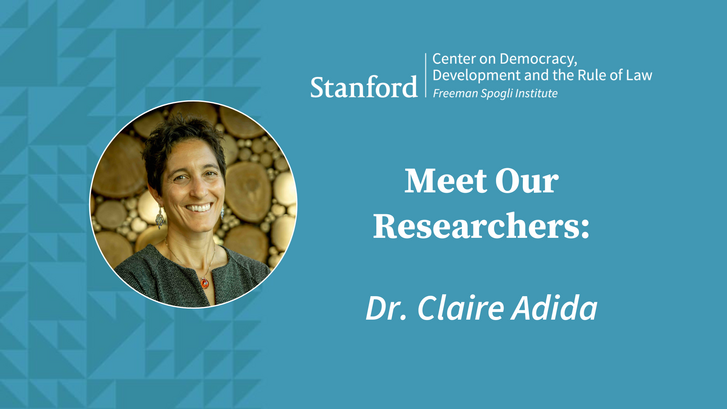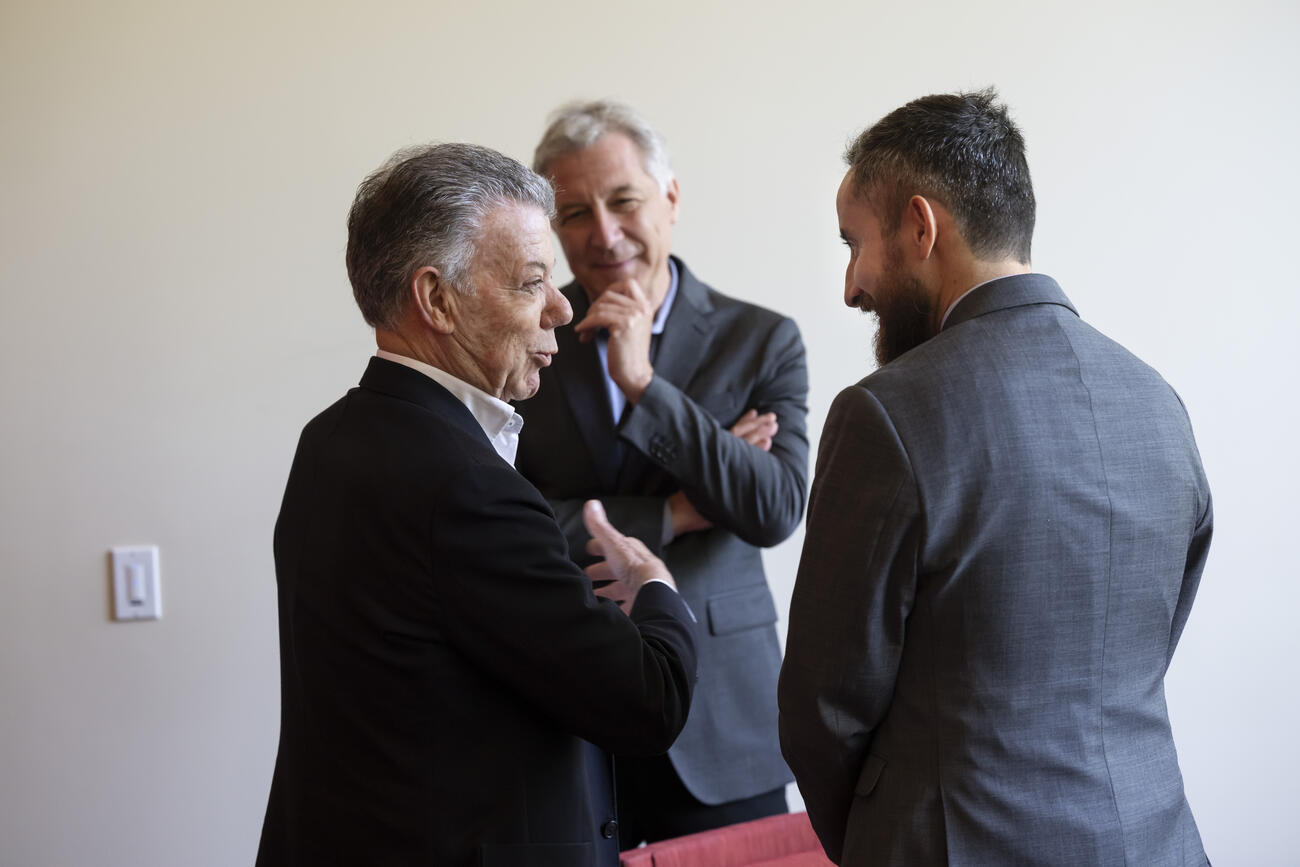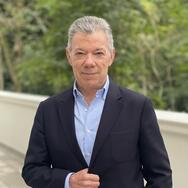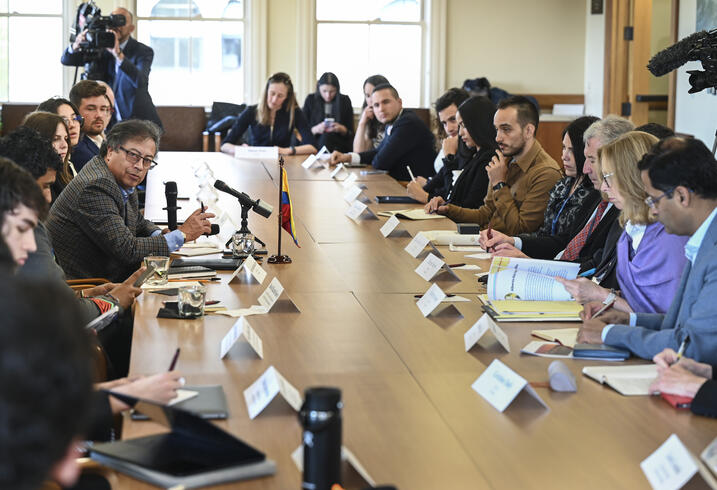Meet Our Researchers: María Ignacia Curiel
The "Meet Our Researchers" series showcases the incredible scholars at Stanford’s Center on Democracy, Development and the Rule of Law (CDDRL). Through engaging interviews conducted by our undergraduate research assistants, we explore the journeys, passions, and insights of CDDRL’s faculty and researchers.
María Ignacia Curiel is a Research Scholar at the Center on Democracy, Development and the Rule of Law, Research Affiliate of the Poverty, Violence and Governance Lab, and Research Manager for the center's Democracy Action Lab at Stanford University. She also co-teaches CDDRL's Fisher Family Undergraduate Honors Program alongside Stephen Stedman.
Curiel is an empirical political scientist who uses experimental, observational, and qualitative data to study violence and democratic participation, peacebuilding, and representation. Her research primarily explores political solutions to violent conflict and the electoral participation of parties with violent origins. This work includes an in-depth empirical study of Comunes, the Colombian political party formed by former FARC guerrillas, as well as a broader analysis of rebel party behavior across different contexts. More recently, her research has focused on democratic mobilization and the political representation of groups affected by violence in Colombia, Mexico, and Venezuela.
What inspired you to pursue your research and your current field, and how did your journey lead you to CDDRL?
I lived in Venezuela as a teenager, during a time when politics were very salient. It was a moment when institutional erosion was happening in front of my eyes. It was very polarized — it was just a very political moment in Venezuela. Everybody's life was affected by politics, and all of these changes were a huge part of life. It was also a very violent moment. And so throughout my upbringing I was always a part of these conversations — at the dinner table, at recess, in the classroom — about why we had gotten to that violent place, and how some actors were trying to change the situation, what they should and shouldn't do, and then how things could be improved I knew that when it came time to go to college, and when I envisioned my career, that I would want to be a part of thinking about how things could be changed when governments were eroding and when societies were going through these massive changes. It was a desire and interest that came from my own experience.
I also had a high school history teacher who was incredibly influential, Antonio Sánchez. He made it a priority to have serious discussions of our contemporary challenges and our history in the classroom. We had heated debates with my classmates about whether protesting and voting made a difference, whether oil made this our inevitable fate, whether we had ever truly been a democracy, whether poverty had improved and whether this increased public spending was sustainable, whether there should be militarized responses to the major violence we were living; all these big questions I continue to think about as a political scientist I actually started thinking about 20 years ago as a teen.
Was there any reason that you chose to go into academia over going to government or public service?
I have always been driven by a desire to contribute to policy, decision-making, and governance. Academia has provided me an opportunity to develop a strong analytical foundation, offering frameworks for understanding the world, insights into how evidence is produced and evaluated, and mastery of rigorous knowledge production itself. I genuinely love the intellectual environment of academia and believe it offers unique opportunities for impact through the production of ideas and evidence. My ultimate goal is to support better policy and decision-making through my academic work, where research directly informs practitioners and policymakers, and perhaps through other types of roles in the future.
What intrigued you about academia?
Conventional conversations on current events were never really satisfying to me — you could always come up with another reason or another argument for why things were or what the solutions should be, and people have their own opinions, biases, and beliefs. But throughout college, I realized there are frameworks for these ways of thinking about the world more structurally that can help us make sense of what's happening. This hooked me in, and I couldn't unsee how useful those tools were — not just to help us understand the world, but to help us get a handle on how humans govern ourselves. I also love students. I love teaching. It's just so gratifying. So, those things together brought me to academia.
What stands out to you about the space of CDDRL?
CDDRL is a really special place. I think the downside of academia can be that there are pressures to publish, which, of course, you still have at CDDRL, but sometimes there are pressures or incentives that push people away from wanting to engage with what's happening in the world. And CDDRL is not that at all. It's also not the opposite: just a constant discussion of current events, without any good analytical tools. CDDRL is the perfect blend of making sense of the world and offering effective solutions, while remaining committed to producing cutting-edge research.
What is the most exciting or impactful finding from your research, and why do you think it matters for democracy or development?
An important line of research in my work has been working with ex-combatants in Colombia, which led to one of the first major findings in my research. The research was with former combatants — people who, for different reasons, become experts in the use of violence to pursue their political beliefs. Typically, we can think of them as radical ideologically. Upon conducting these interviews with intervention, we found that ex-combatants who received an intervention to help them better understand civics and political structures showed a moderation in their preferences towards less radical political participation. What that says to me is that even though some actors have invested in radical and antidemocratic means of participating in or influencing politics, these same actors can be incorporated into politics in a way that's not violent yet is democratic. I think that's an optimistic story.
When recruiting participants for that study and engaging them, how did you get ex-combatants to participate in a study on political science? How did these conversations go, and how did you incentivize them to participate?
As you may imagine, these are populations of people that are difficult to access and that are very untrustworthy. There is some danger, whether from them or from groups targeting former combatants. When conducting these interviews, several constraints arose. Part of the lesson was that the approach had to go through as many gatekeepers to these populations as possible, such as trusted local leadership and community members. There was a process of gaining trust; this wasn't like knocking on a door and asking, “Would you like to participate in research?” With these kinds of populations, earning trust and being transparent is important — sharing who you are, why you're there, what you're going to do with that information, why it's important for them to participate, and how the participation can be useful to them.
How do you see your research influencing policy and contributing to real-world change?
This is important to me, as I see my research being helpful to different kinds of policymakers in different ways. The first is the evidence on specific interventions that I've evaluated with some coauthors. These include interventions like this civic inclusion, the interventions we evaluated with ex-combatants, and another project I'm working on — a political efficacy intervention with women in rural communities. Specifically, from these kinds of interventions, there are clear lessons for organizations that are working to scale these kinds of efforts, like the UN's peacekeeping operations and agencies that develop reintegration programming. I have some evidence from my research that I think could be helpful for negotiation processes, related to the role of guarantees of power in negotiations and how that might affect long-term political considerations that can shape the prospects for peace. I also work with the Democracy Action Lab, a new venture here at CDDRL, whose mission is to produce research useful to democracy practitioners as they develop their strategies and to other organizations that support them.
You were discussing how the world you grew up in very much shaped the direction you went into. With the motion of current events over the past few decades, has your research focus shifted any more? How do you see your work changing in the global era we're in right now?
I started by telling you how my life in Venezuela shaped my desire to understand politics and governance. But I didn't actually spend the first part of my academic career studying Venezuela. I turned my attention to a process of negotiation and transition from a seemingly intractable conflict in Colombia, and the tensions and dilemmas inherent to these paths out of conflict. This knowledge, I believe, is informative of paths out of civil war, but also out of circumstances like the ones Venezuela faces today. Fast forward to today, amid the broader decline of democracy and the disappearance of the process of democratization, I'm coming back to these problems of responding to emboldened authoritarians, and how that intersects with the problems of violence and the actors who use it. It's becoming increasingly difficult to be a social scientist and not try to respond to the problems of the moment. People have different opinions about what the role of academics and the social sciences should be, but I'm of the opinion that part of our job is to help explain and understand the world we're in now. It's what the moment requires of us.
What’s one focus you have in your career at this moment?
Part of what I'm grappling with is making sure the questions I ask in my research are relevant to this moment and also to future moments. What are broader processes, general dilemmas, or general problems, for either policymakers or for the general dynamics that the citizenry faces? Additionally, how do we make sure these topics are in conversation with the broader public? Right now, the value of higher education and academia is being questioned by people in power, and there are significant pressures on academia. I think it's important to elevate our insights, their relevance, and make them legible and accessible to people more generally.
What book do you recommend for students interested in a research career in your field?
It depends on where your interests lie, but here are three:
For those interested in civil conflict and the dynamics of civil war, I recommend Rebelocracy: Social Order in the Colombian Civil War by Ana Arjona for understanding why rebel organizations engage in the strategies they do and how communities respond.
For those interested in authoritarian strategies and elections, I would recommend Voting for Autocracy by CDDRL’s own Beatriz Magaloni.
- And for those interested in understanding the general strategies of leaders, The Dictator's Handbook by Alastair Smith and Bruce Bueno de Mesquita is a wonderful and connected overview of autocracy and the incentives of leaders.
Read More
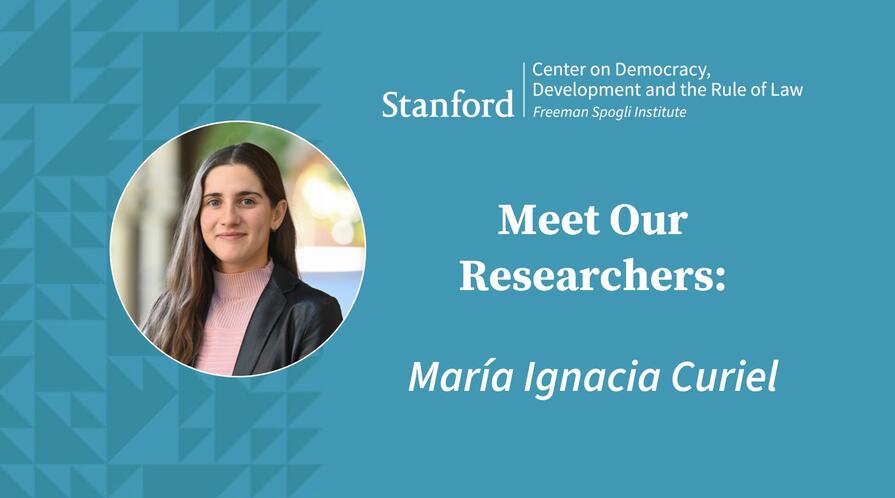
Tracing paths from political violence to democratic participation with CDDRL Research Scholar María Ignacia Curiel.



